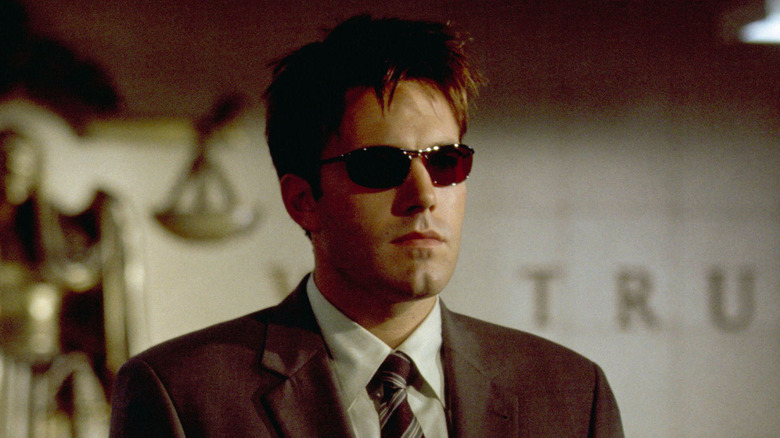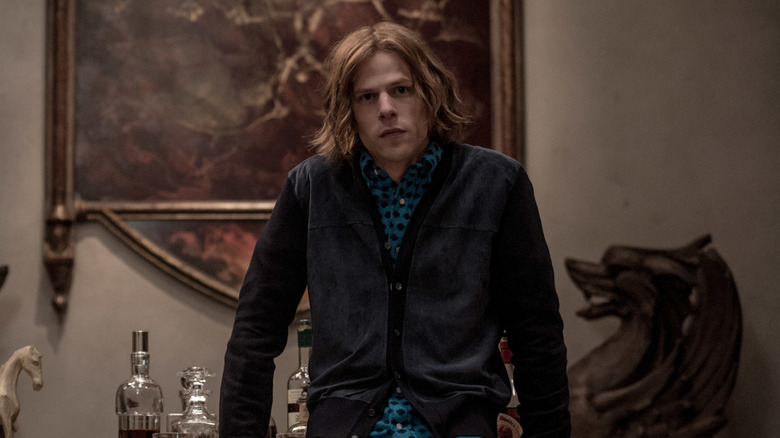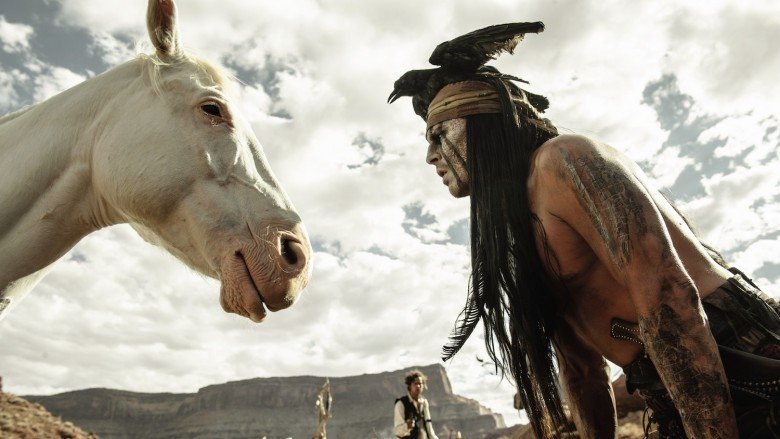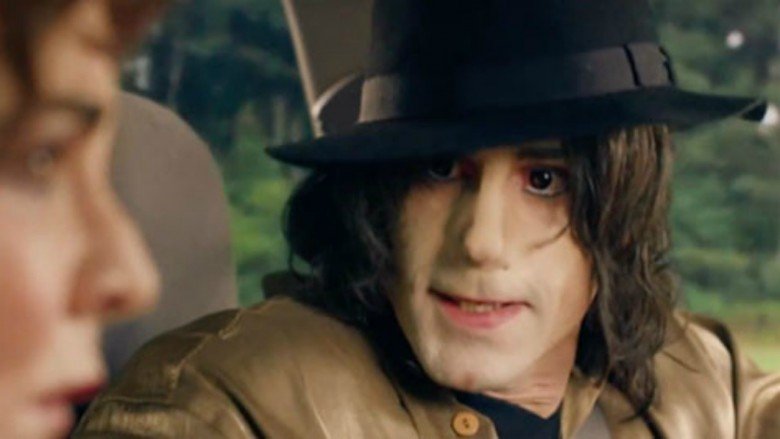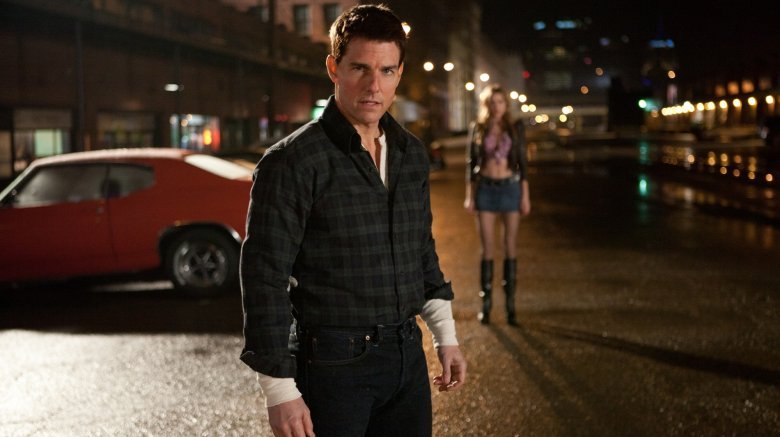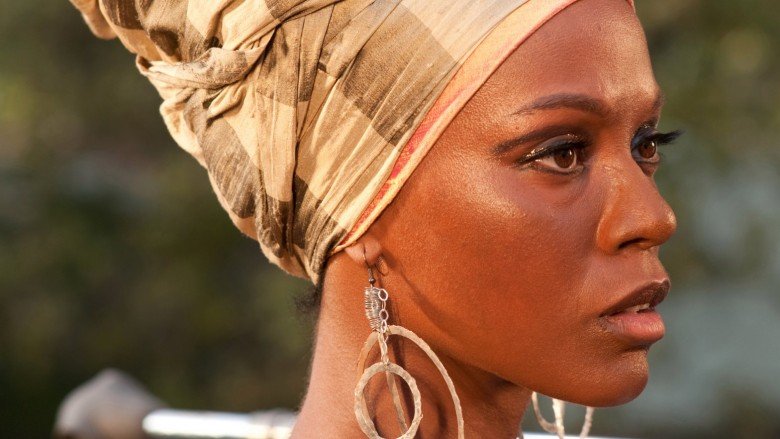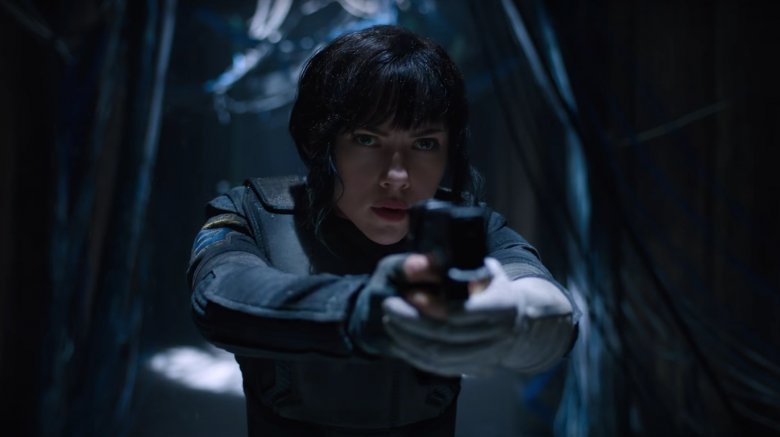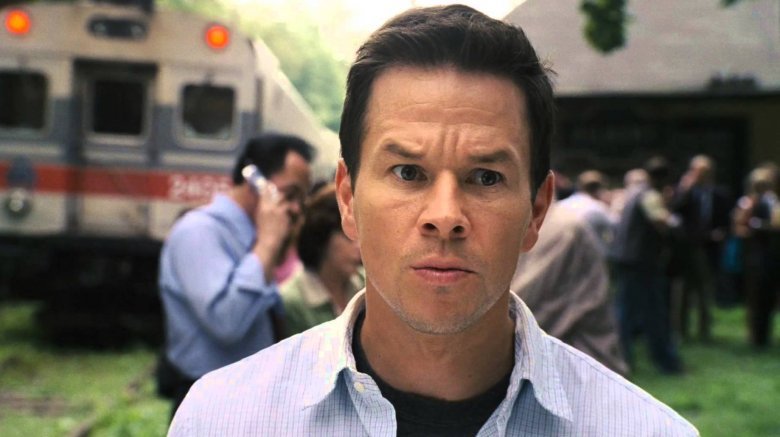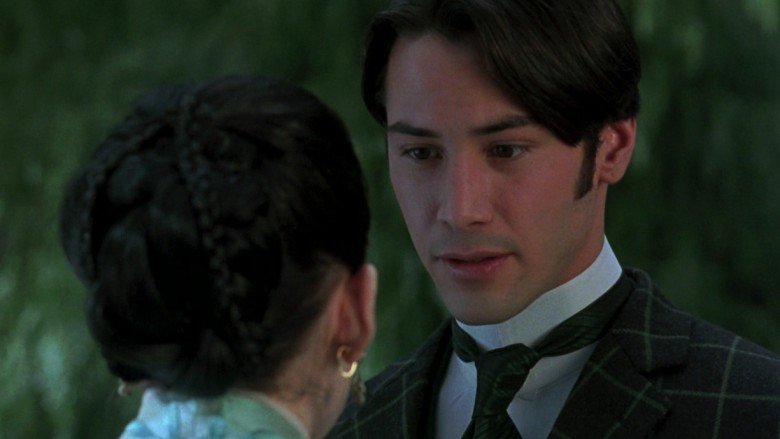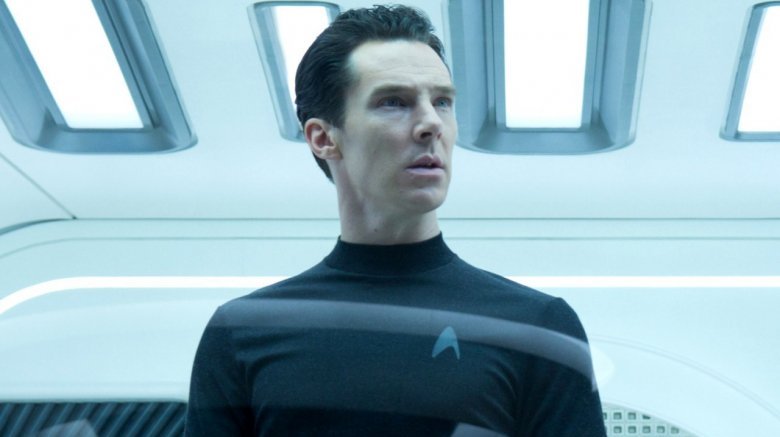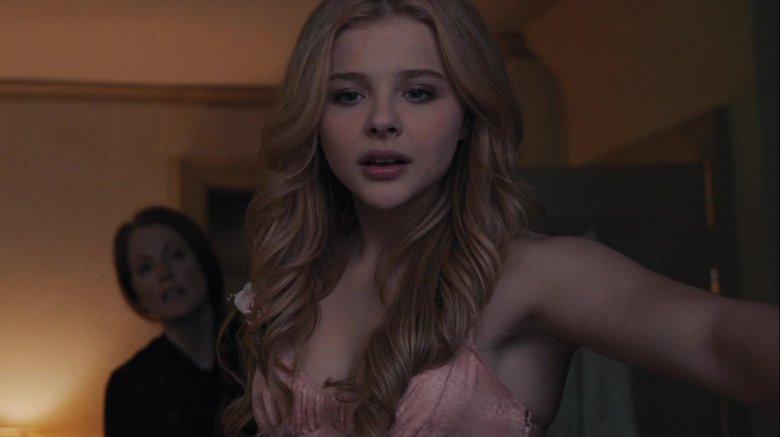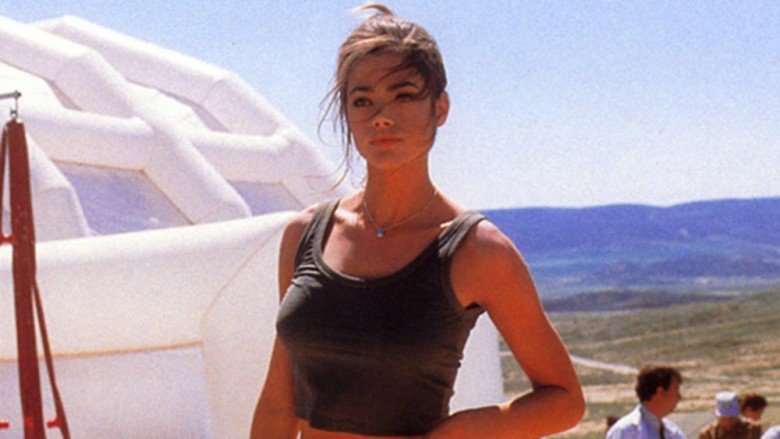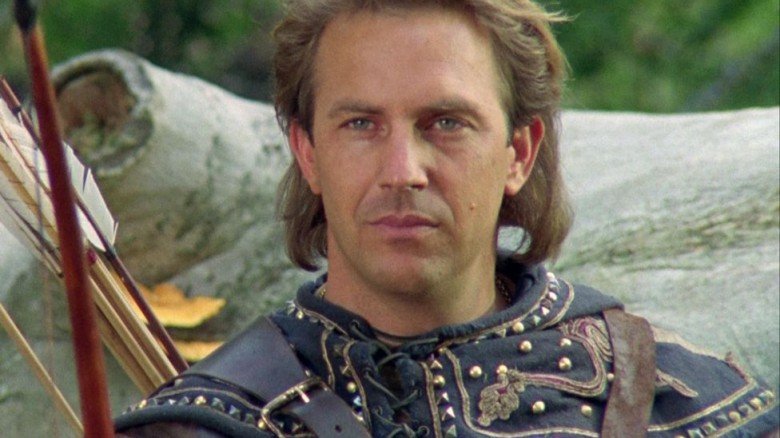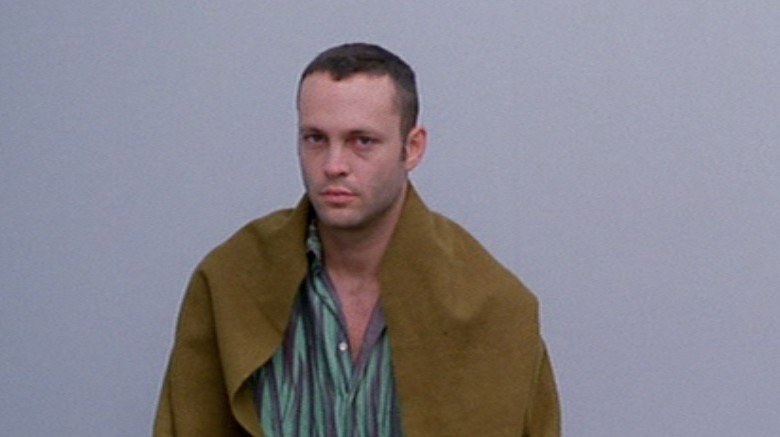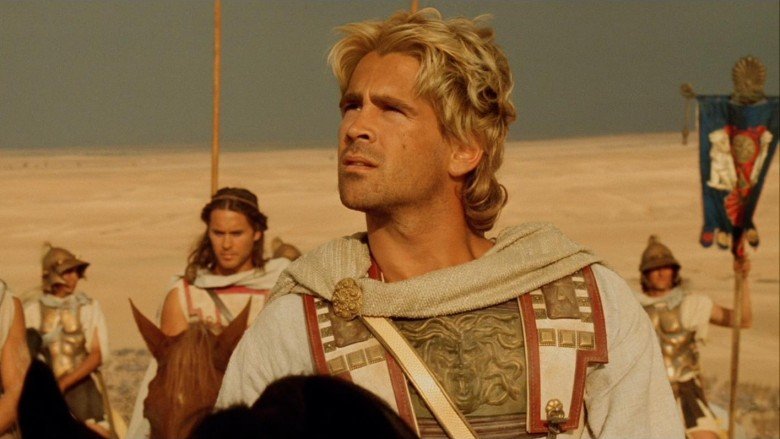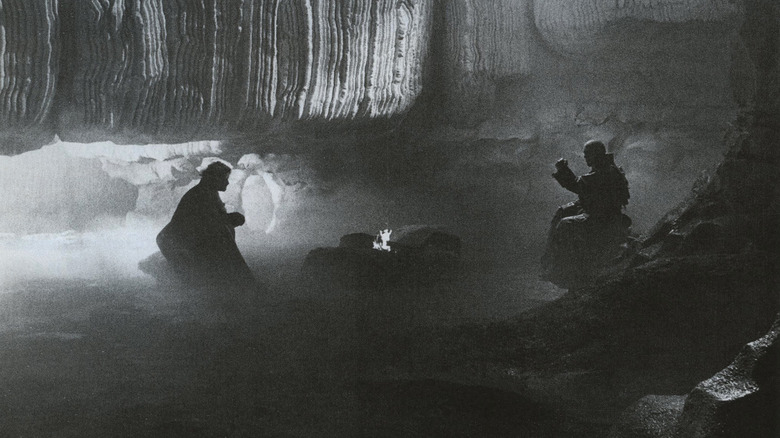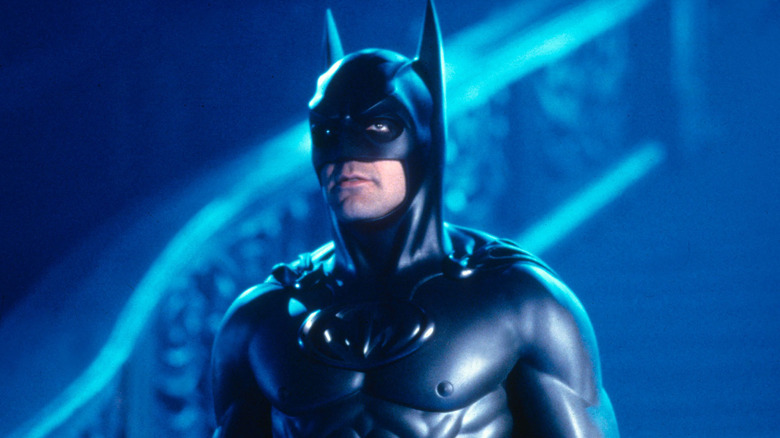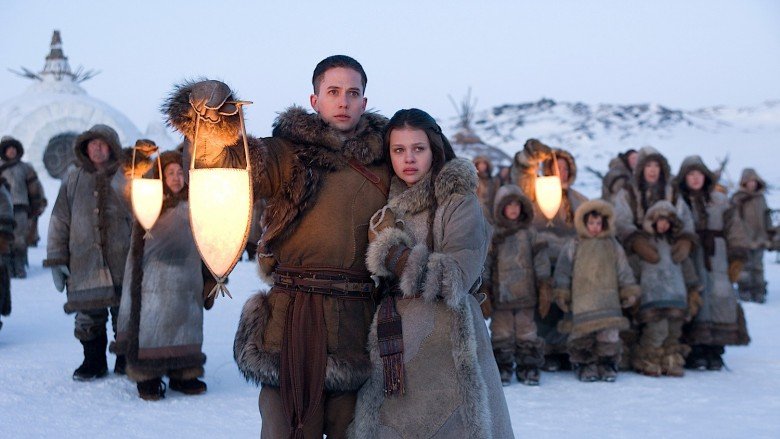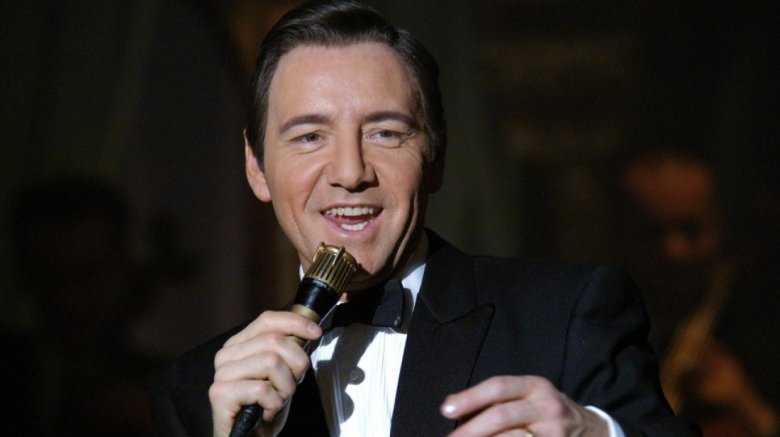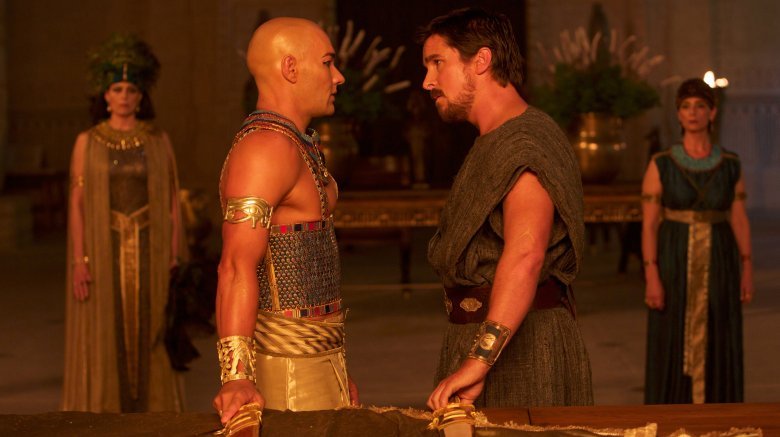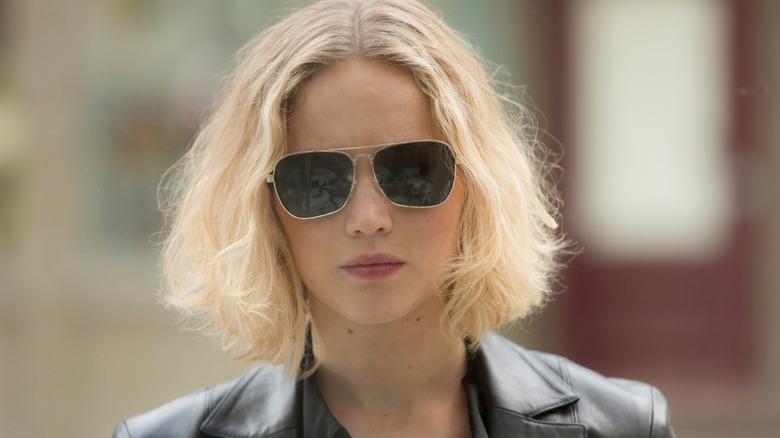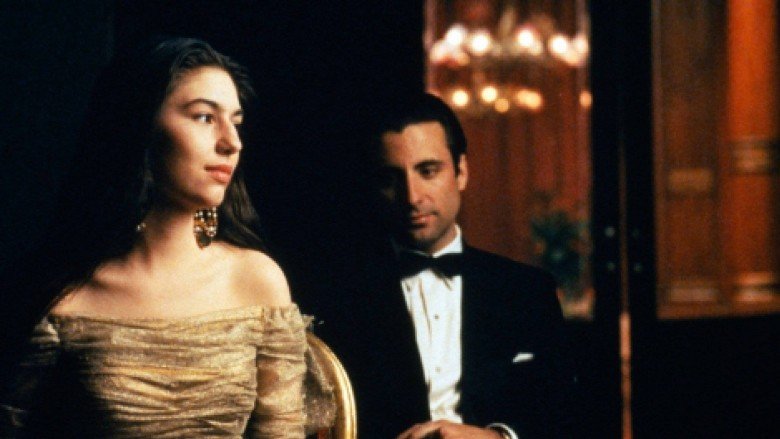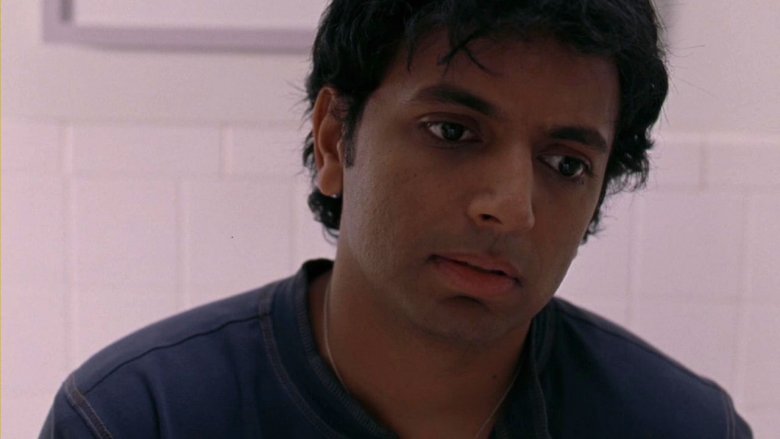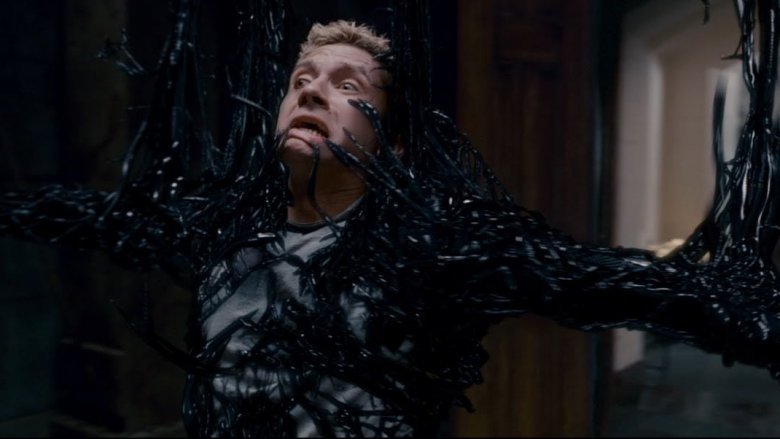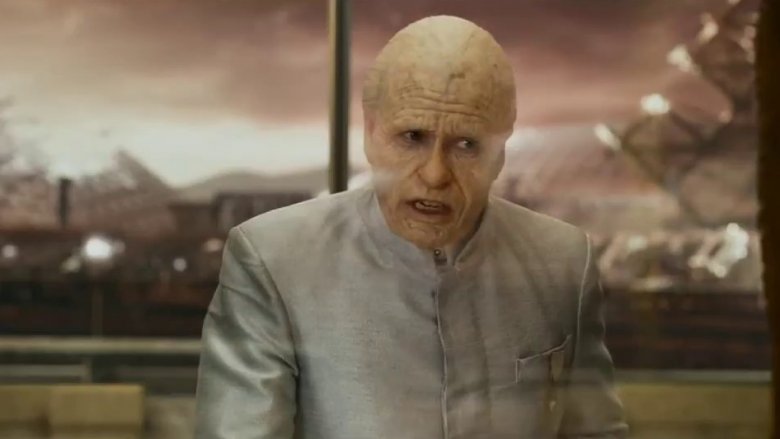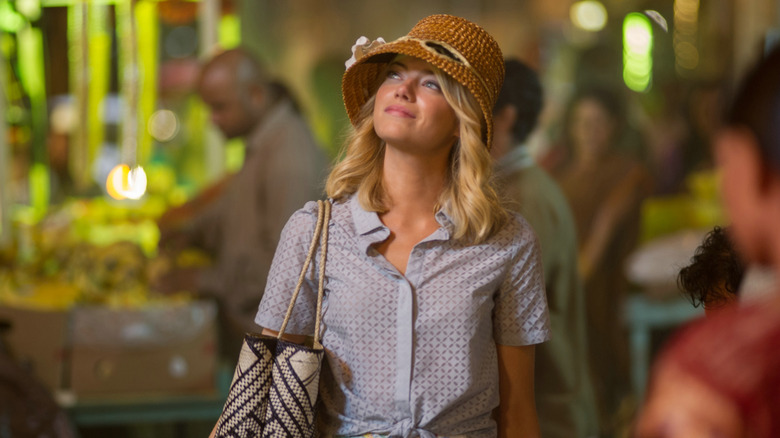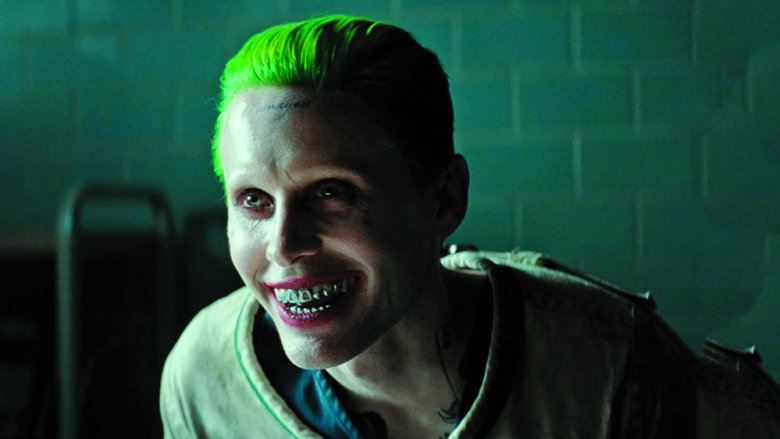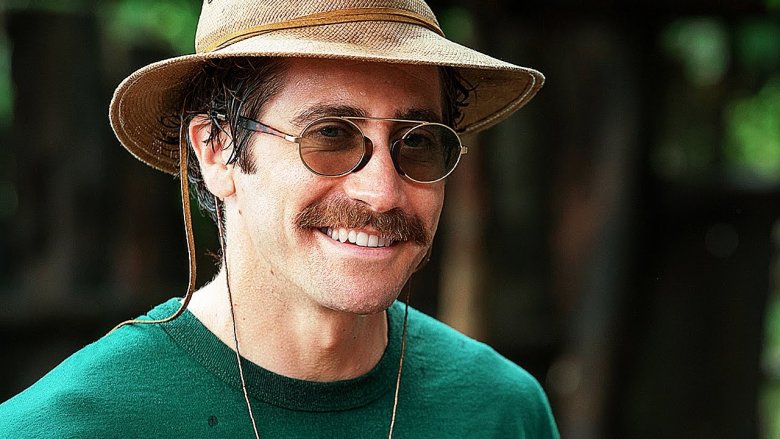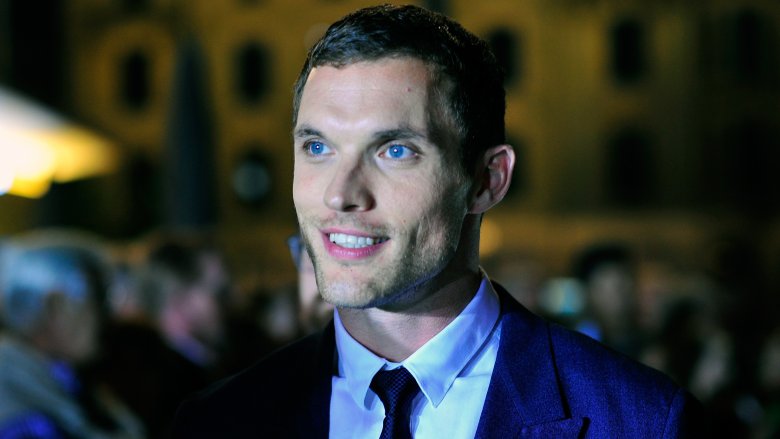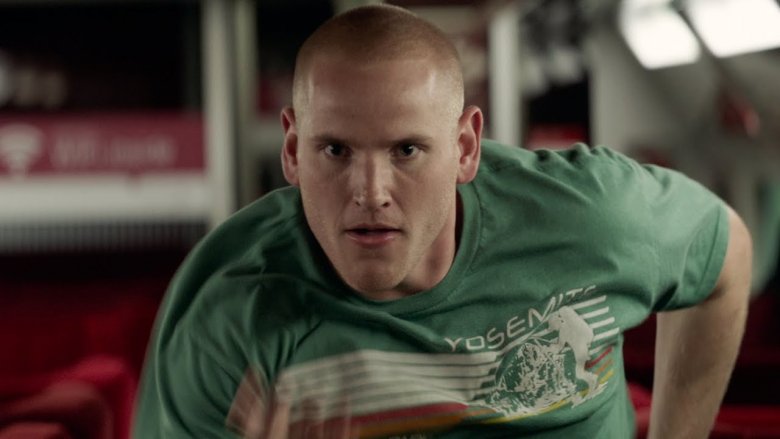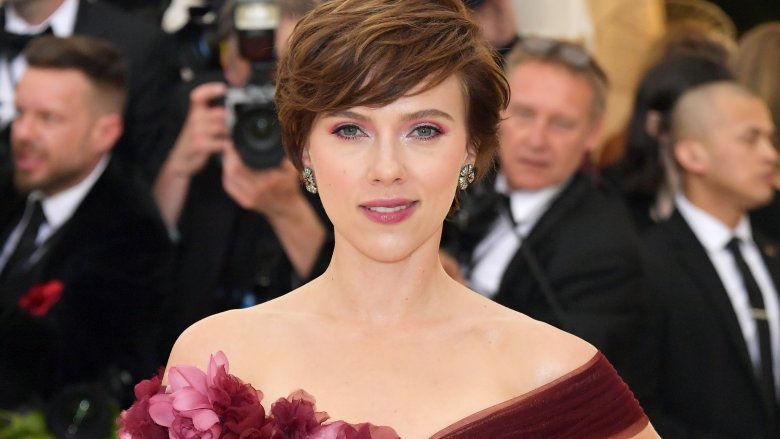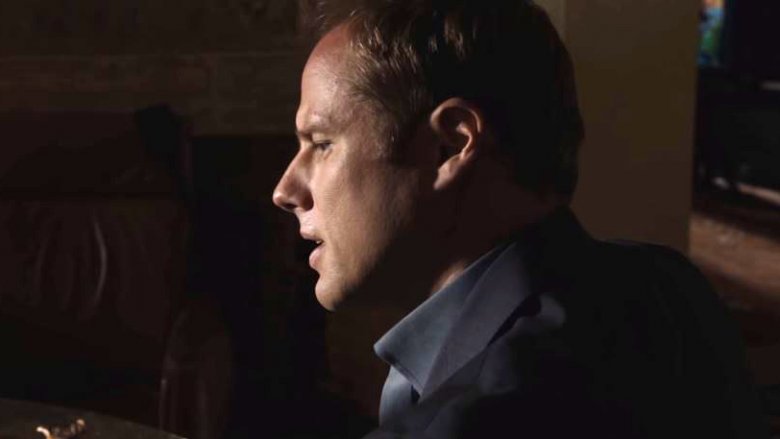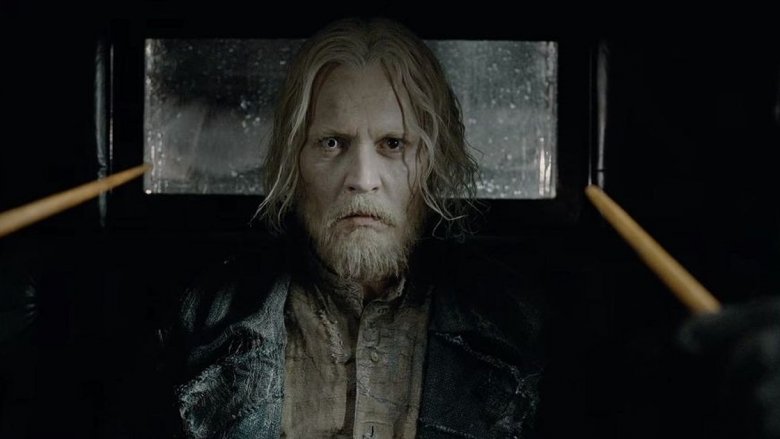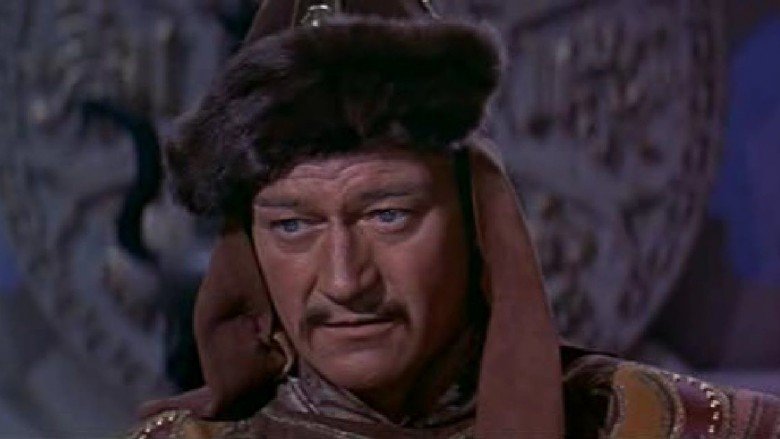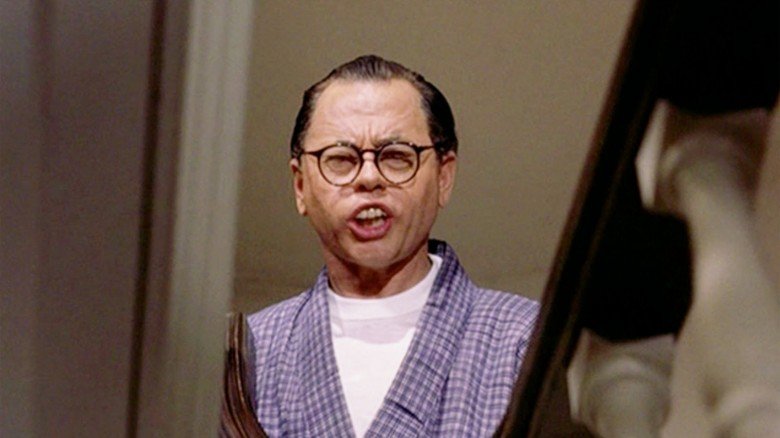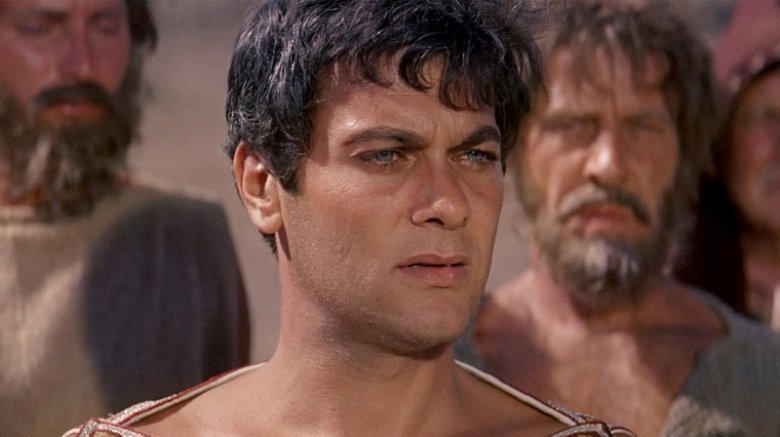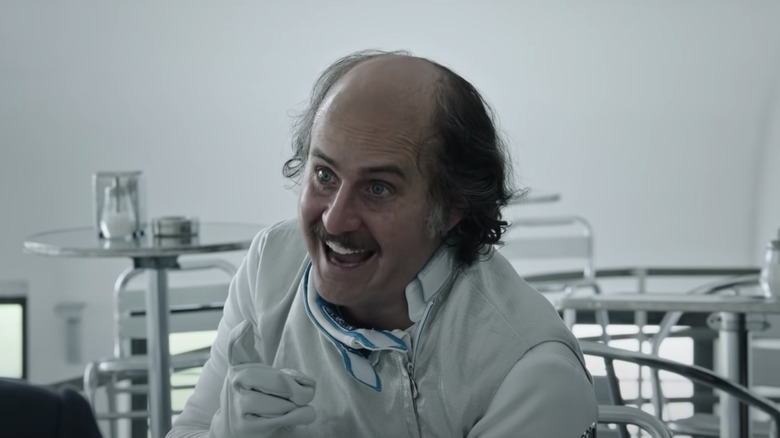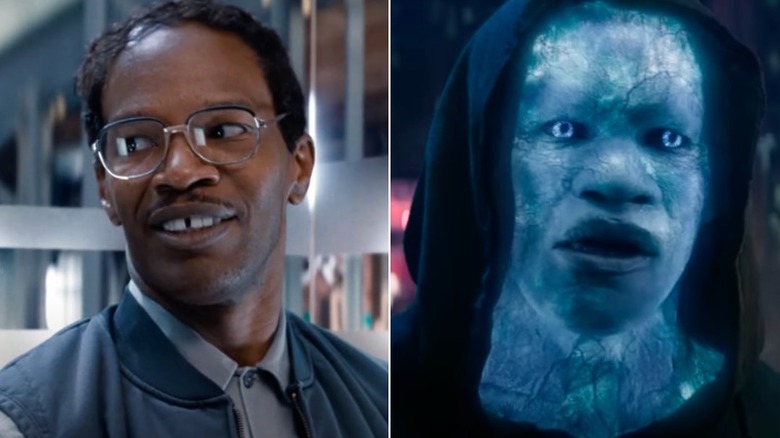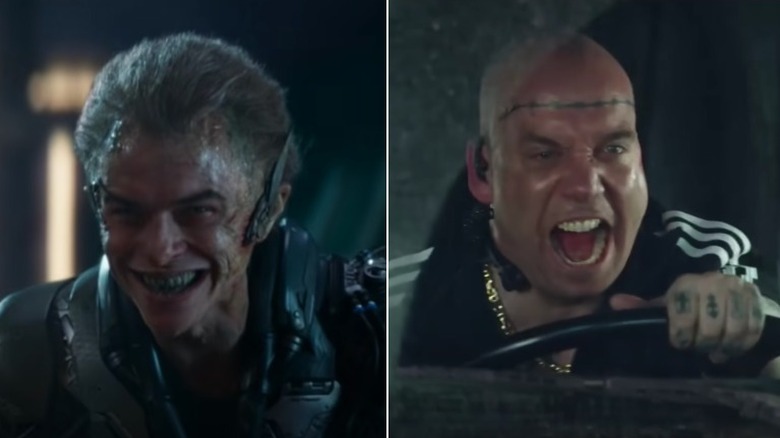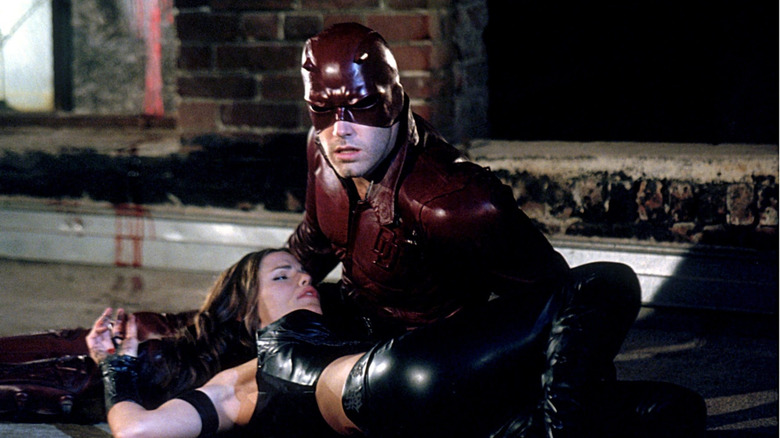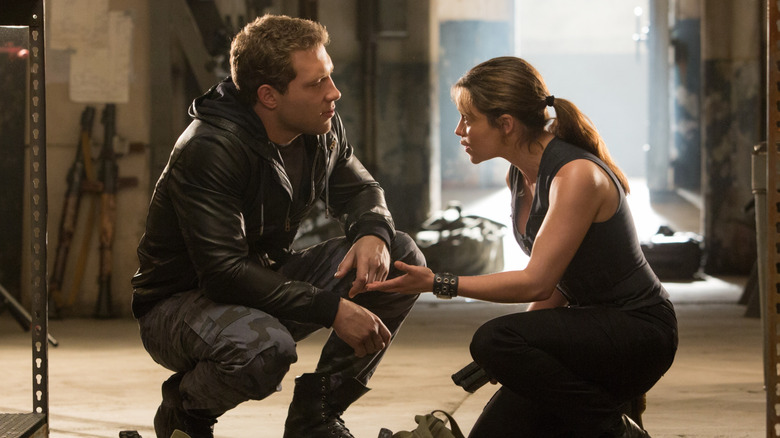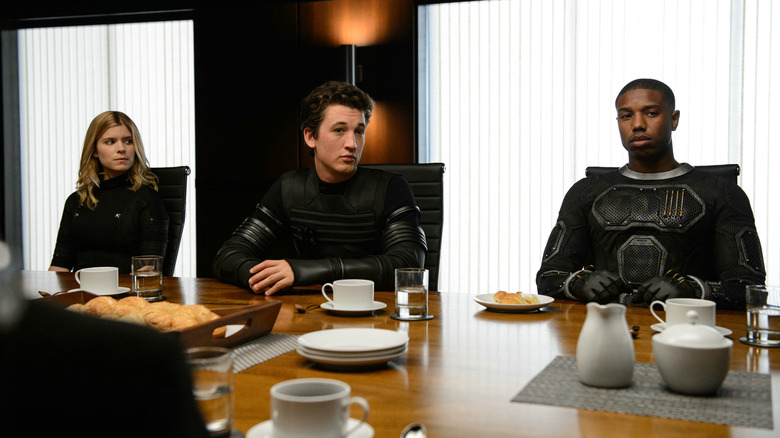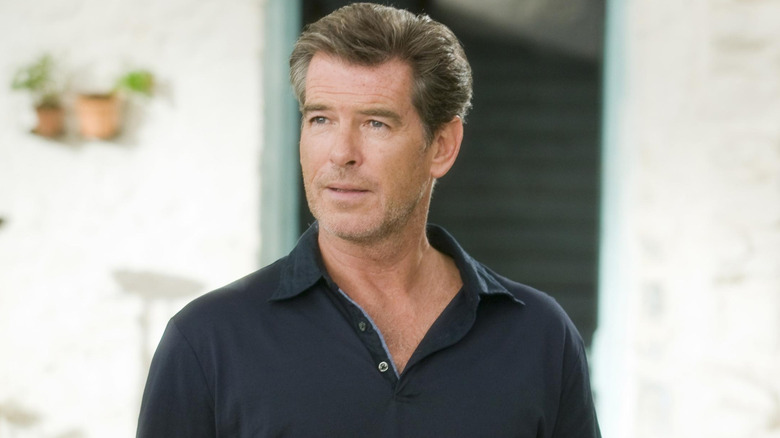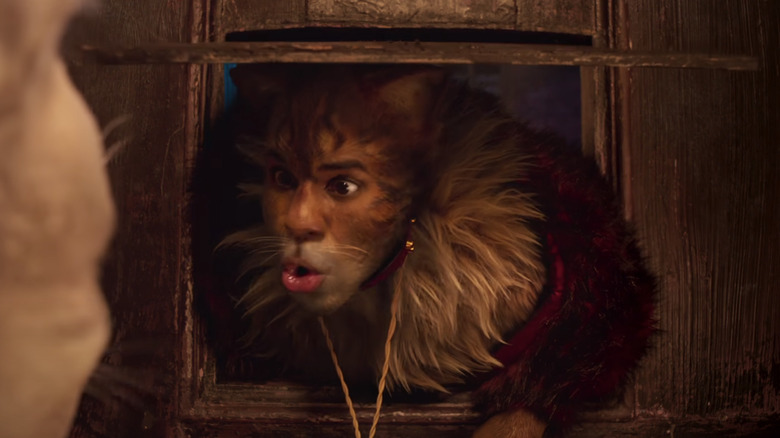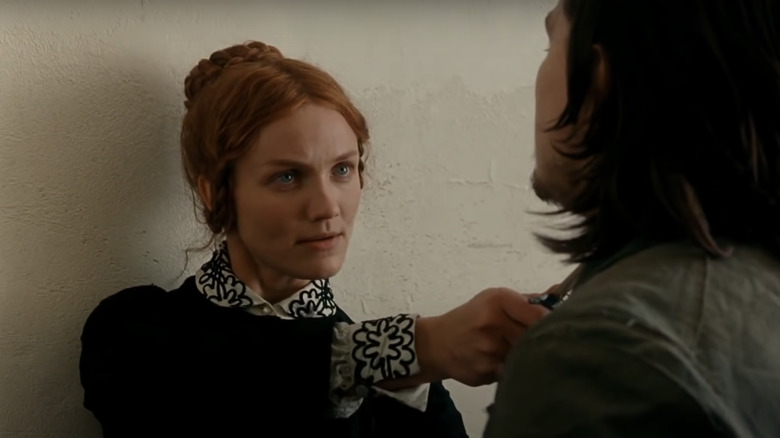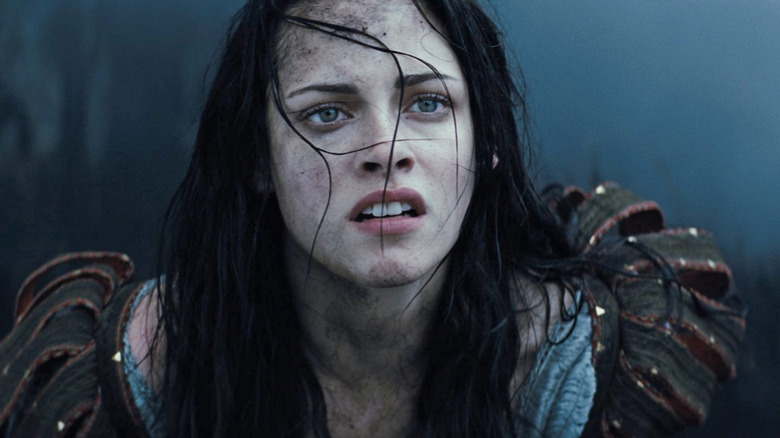The Most Disastrous Castings Ever
Casting a key role can be critical to a film's success, particularly when it comes to characters that have been deeply explored in real life, written format, or even a prior production. Knocking it out of the park with the right actor or actress can mean the difference between being an audience favorite and becoming an all-out laughingstock. In the cases of these films and TV features, the casting decisions were so awful that the projects suffered greatly — and in many cases, became near-universal pans. Whether or not a different actor might've done the job justice is up for debate, but it's inarguable that these actors were just plain wrong for their roles.
Jesse Eisenberg as Lex Luthor
Lex Luthor is one of the all-time great comic book villains, right up there with Magneto and Dr. Doom. So when word spread that he'd show up in Zack Snyder's Batman v Superman: Dawn of Justice, fans wondered which lucky actor would bring the bald bad guy to life. Many hoped for Bryan Cranston—a man who knows a thing or two about playing shaven supervillains—and when news broke that Jesse Eisenberg would play Superman's arch-enemy, well, fanboys weren't exactly pleased.
Things only got worse when people actually saw the film. While DC fans and movie critics don't usually see eye to eye, most agreed that Eisenberg was totally miscast as the Man of Steel's main villain. Many believed his interpretation of the character was far too manic, too loud, and way too similar to a certain Clown Prince of Crime. For example, Christopher Orr of The Atlantic wrote that Eisenberg "comes across like an improbable—and thoroughly unappetizing—blend of Tracy Flick and the Joker." Devin Faraci of Birth.Movies.Death. followed up with another impressive burn, saying, "Eisenberg delivers every line like he thinks the villains on the 1966 Batman show were too nuanced."
Others have described Eisenberg's Luthor as a "goofball" or "annoying," and his neurotic intensity just feels off when he's standing next to Ben Affleck and Henry Cavill, both of whom are desperately trying to out-frown one another. While there's no denying Eisenberg is a brilliant actor (see The Social Network, The Double, or Zombieland for proof), here's hoping his Lex Luthor stays locked up for a long time.
Johnny Depp as Tonto
Johnny Depp has certainly endured his fair share of career setbacks of late, but The Lone Ranger was an especially big bomb. The film reportedly lost Disney a whopping $190 million after critics and audiences alike were unimpressed by the film's attempt to reboot the popular Western TV show for the big screen. One of the most prominent issues with the film, it seemed, was the selection of Depp for the role of Tonto, a Native American sidekick. While Depp has virtually made his entire career out of being a screen chameleon whose performances have included heavy makeup and prosthetics, his Native makeup designs and headgear prompted blowback for the racist undertones of his "redface" appearance.
Joseph Fiennes as Michael Jackson
The first look at Joseph Fiennes in the role of the King of Pop for an episode of Sky Arts' Urban Myths was an instant meme generator. Not only did the digital universe love how ridiculous the actor looked in his cartoonish imitation of Michael Jackson, but it was also another groan-worthy installment of the Hollywood whitewashing tradition, and Jackson's family, including his daughter Paris Jackson, openly took umbrage with the depiction. In a now-deleted tweet, Paris wrote that she was "so incredibly offended by it" that it made her "want to vomit." Following the backlash, the network decided to pull the episode, which would have also featured a historical/fictional look at Elizabeth Taylor and Marlon Brando, writing, "This decision was taken in light of the concerns expressed by Michael Jackson's immediate family. We set out to take a light-hearted look at reportedly true events [and] never intended to cause any offence. Joseph Fiennes fully supports our decision." It isn't often that a feature is bad enough to actually get pulled from screens, but hey.
Tom Cruise as Jack Reacher
Tom Cruise is one of the last true movie stars. Sure, he's made some questionable life choices, but that doesn't negate his star power, his stuntman skills, and his incredible screen charisma. Having said all that, it's still kind of weird that Cruise got the part of Jack Reacher.
A hulking military veteran who travels across America, facing bad guys and righting wrongs in Lee Child's series of bestselling novels, Jack Reacher is supposed to stand 6'5", weigh 250 pounds, and swagger around with a 50-inch chest. Tom Cruise is a pretty fit dude, but the 5'7" superstar doesn't exactly match those qualifications, and this bizarre decision led to a lot of outrage. One angry reader wrote that "Lee Child fans feel betrayed," and another claimed that Cruise "literally ruined the whole character." One irate fan even went so far as to say that Cruise-as-Reacher was the "most ridiculous casting ever."
Child himself pointed out that the filmmakers were never going to find an actor who came anywhere close to fitting Reacher's stature, and what Cruise lacked in build, he made up in intelligence and intensity. However, Dwayne Johnson later revealed that he tried out for the part and was turned down. While Jack Reacher met with a mostly positive reaction from critics, you've got to think that casting the Rock would've probably pleased far more fans.
Zoe Saldana as Nina Simone
Zoe Saldana is usually a can't-miss actress when it comes to audience appreciation, but casting her in the lead role in Nina, the 2016 biopic of the groundbreaking jazz musician Nina Simone, was a critical misstep. While Saldana is herself black, she replaced artist Mary J. Blige in the role and many complained that she was not physically representative of her real-life counterpart because she was fairer-skinned and much more traditionally pretty than Simone. Simone's family hated Saldana's portrayal. And while the distribution company's reps praised Saldana's fitness for the portrayal above any physical differences, the film was still universally panned by reviewers and audiences, many of whom felt that Simone's looks were an essential element to prove just how exceptional her talents were.
Scarlett Johansson as Major
One of the biggest casting scandals in recent history started in 2015, when the world learned who'd play Major in a live-action remake of Ghost in the Shell. The original film, released in 1995, is generally regarded as one of the greatest animes of all time, and as Robert Chan of the Media Action Network for Asian Americans (MANAA) pointed out, starring in this English language adaptation would've been a fantastic opportunity for an actress like Rinko Kikuchi, Karen Fukuhara , or Chloe Bennet.
Instead, Paramount went with Scarlett Johansson.
In case you haven't noticed, Scarlett Johansson is not Japanese. In fact, she's not Asian at all. The news of her casting sparked quite a bit of online fury, and over 100,000 people signed a Care2 petition in protest. Groups like MANAA condemned the news, and soon the hashtag #WhiteWashedOut was trending on Twitter.
Sadly for everyone involved, Ghost in the Shell bombed at the box office, and some suspect the critical backlash surrounding the whitewashing incident helped sink the film. Hopefully, the Scarlett Johansson controversy will convince Hollywood to be a little more diverse when it comes to casting—although it'll probably just inspire studios to stop remaking anime movies.
Mark Wahlberg as Elliot Moore
By and large, M. Night Shyamalan has a pretty solid track record when it comes to casting. There's Haley Joel Osment in The Sixth Sense, James McAvoy in Split, and the entire cast of Signs. Of course, there have also been a few misfires in his filmography, and as far as casting mistakes go, it doesn't get much worse than Mark Wahlberg in The Happening.
Now, if you put Wahlberg in the right film, you can get movie gold, a la Boogie Nights or The Departed. But shove him into the wrong movie, and you'll send your audience into hysterics...in the "laughing at you," not "laughing with you" kind of way. And in this eco-thriller, Wahlberg is definitely in the wrong role, playing a panicked high school science teacher with some of the worst line delivery in cinematic history. In fairness, Shyamalan's script isn't doing Wahlberg any favors, but the actor does bring an extra special awfulness to the proceedings, prompting Rolling Stone to dub The Happening Wahlberg's worst film.
Stuart Heritage of The Guardian wasn't any kinder, writing, "If Shyamalan meant for this to be a serious environmental film, Wahlberg makes sure that he undercuts the sincerity at every possible turn." Jason Bailey of Flavorwire quipped that the actor was "doing a weird kind of upper-vocal-register acting that makes you think Andy Samberg did most of his 'Mark Wahlberg Talks to Animals' prep here." Even Wahlberg himself admitted the film wasn't his best moment, saying it was "a bad movie." Still, we kind of sympathize with the guy, as he just wanted to shake things up. "You can't blame me for wanting to try to play a science teacher," Wahlberg said. "At least I wasn't playing a cop or a crook."
Keanu Reeves as Jonathan Harker
Speaking of hilariously bad acting, Keanu Reeves has quite a few "whoa" performances to his name–who thought it would be a good idea to cast him as Buddha anyway? The one that takes the cake, though, is his supporting role as Jonathan Harker in Bram Stoker's Dracula. Despite the fact that the film won three Oscars for its costuming, sound effects, and makeup crews, Reeves' portrayal of the curious estate agent who comes to know the Count was marred by a terrible British accent and over-the-top reactions. Director Francis Ford Coppola kindly remarked that Reeves "tried so hard" when it came to speaking with an English affectation, but that so much effort was ultimately the issue with his portrayal, saying, "He wanted to do it perfectly and in trying to do it perfectly it came off as stilted."
Benedict Cumberbatch as Khan Noonien Singh
Whitewashing has always been a problem in Hollywood, but you'd think we would've moved past all that in the far-off future of Star Trek. After all, Gene Rodenberry's TV show featured a world where racism was non-existent (aside from the occasional potshot at Vulcans), and the 1960s series starred actors like George Takei and Nichelle Nichols in an era when television was decidedly less than diverse. True, the show didn't get things perfect all the time. Take the character of Khan Noonien Singh, for example. A genetically engineered superhuman, Khan was a dictator-turned-space rogue of Indian origin, and while Ricardo Montalban absolutely owned the role, he was Hispanic, not Asian.
Still, at least they didn't give the role to a Caucasian...which is exactly what happened in Star Trek Into Darkness. Ignoring talented actors like Naveen Andrews, Dev Patel, or anyone from Bollywood, director J.J. Abrams picked Benedict Cumberbatch, a white Englishman. If you're at all familiar with Indian history, you can see why this might've been an especially insensitive choice; as Rachel Edidin of Wired wrote, "The racial politics of casting a British guy as an Indian man originally played by a Mexican actor are dubious as hell."
Even Takei was upset with Abrams' decision, telling IGN that "to cast a white, British, wonderful actor and name that character Khan, is really not understanding Gene Roddenberry's philosophy." Really, Abrams should've given an Indian actor a shot at starring as the main bad guy in a major summer blockbuster—or he could've just made Cumberbatch a character other than Khan. After all, it's not like the whole Khan reveal is critical to the story. They could've just stuck Cumberbatch in a Gorn suit, and then everybody would've been happy.
Chloe Grace Moretz as Carrie White
Remaking Carrie always seemed like a pointless endeavor. After all, the Brian De Palma original is a bona fide classic, and it's hard to beat perfection. Evidently, audiences and critics agreed, as the film had a disappointing run at the domestic box office and earned a disappointingly low approval rating on Rotten Tomatoes. And while you certainly can't lay all the blame on the shoulders of its star, Chloë Grace Moretz, you've got to wonder what might've happened if MGM had gone with an actress who was a little more, well, weird-looking.
If you're familiar with the story, then you know Carrie is a painfully shy girl who's mercilessly harassed by bullies, largely because she's a misfit with no social skills and little understanding of how the world—or her own body—really works. So it would've helped if Carrie had actually looked kind of awkward, like the type of kid bullies would want to torment. Unfortunately, Moretz is just too pretty for Carrie's own good; as Jay Bauman of Red Letter Media put it, she "looks like the kind of girl that would be picking on Carrie in one of these movies."
Indeed, if you compare Moretz to the original Carrie, Sissy Spacek, it's pretty clear who should play a victim and who should play a bad guy. As Matt Goldberg of Collider wrote, "At most, [Carrie] is the ugliest girl at Supermodel High," so perhaps it would've made more sense to cast Moretz as one of Carrie's tormentors...or to have skipped the whole remake business in the first place.
Denise Richards as a Bond girl
For some actresses, the idea of becoming one of the female vixens in a James Bond movie is a career benchmark, and Denise Richards was a promising up-and-comer by the time she nabbed a siren role in 1999's The World Is Not Enough. However, many have criticized her stint as Dr. Christmas Jones, a nuclear physicist who worked for a defunct international organization. What respectable scientist wears crop tops and Daisy Dukes on the job anyway? It was an obvious effort to play at some hot-yet-smart appeal, but the result was that she is widely regarded as the worst Bond girl ever.
Kevin Costner as Robin Hood
Kevin Costner was another American actor who just couldn't handle a British tone in 1991's Robin Hood: Prince of Thieves. The film was ridiculed before it ever hit theaters but still managed to steal a nice chunk of change at the box office. Even despite its commercial success, Costner's accent troubles prompted Cary Elwes, who portrayed the same character in the slapstick comedy version, 1993's Robin Hood: Men in Tights, to famously say, "Unlike some other Robin Hoods, I can speak with an English accent." Ouch.
Vince Vaughn as Norman Bates
The theory that any reboot of Alfred Hitchcock's Psycho would be disfavored has largely been set aside by the success of TV's Bates Motel. So, however unnecessary or inadvisable the 1998 remake of the film was, Vince Vaughn's portrayal as Norman Bates is part of the blame for why the pic was such a disaster. Granted, it was the script which added those scenes which eliminated any semblance of sanity that might've made the character's nefariousness a surprise in the original film (hello, peephole scene), but Vaughn's eerie demeanor lacked the charm and vulnerability that marked Anthony Perkins' portrayal so shocking in the first place.
Colin Farrell as Alexander
Irish actor Colin Farrell has had a fair number of acclaim-worthy performances, but his eponymous turn in Alexander was not one of them. Not only has his casting been panned for being culturally insensitive to Greek culture, but he was simply not convincing as the type of morally bereft and greedy emperor that could make history books eternal for his conquering prowess. Farrell, for his part, has since been able to laugh off the criticism, particularly when it comes to his terrible bleach blonde locks look, saying on The Graham Norton Show in 2013, "That was my Doris Day look ... [Alexander] was the golden-locked child, but he shouldn't have been. He should've been brunette. And maybe he shouldn't have had an Irish accent — only from the 7,000 reviews I read."
Robert De Niro as the Creature
Robert De Niro's performance as "The Creature" in Mary Shelley's Frankenstein might've been less ridiculous if he had been gifted with a less ridiculous makeup regimen, but alas. His portrayal was also panned for maintaining a deeply New York accent, while the others of his ilk spoke with more European tones. The fact that he was still, beneath all the heavy facial coverings, the same "You talkin' to me" De Niro we all know and love was distracting at best, and absolutely terrible at worst.
George Clooney as Batman
Even George Clooney knows that his casting as Bruce Wayne was all wrong–almost as wrong as the entire movie within which he did it, 1997's Batman & Robin. As Clooney recalled in a hilarious interview with The Graham Norton Show about his turn as the Batman, replacing Batman Forever's Val Kilmer in the role, "I always apologize for Batman and Robin. I actually thought I destroyed the franchise until somebody else brought it back years later and changed it. I thought at the time, 'This is going to be a very good career move.' It wasn't." Clooney has cited difficulties with the "60 pound" costume as part of the reason his portrayal was too rigid, but there's no doubt that the portrayal lives on as one of the weak spots on his resume and the DC films taken together.
Jackson Rathbone and Nicola Peltz in The Last Airbender
M. Night Shyamalan was on a real cold streak by the time he decided to helm a live-action adaptation of the animated series Avatar: The Last Airbender, but the film did nothing to prove his muster as a moviemaker due its failures critically and at the box office. And while he's since placed the blame for the flop on adults not understanding his movie, there's also the matter of his whitewashing casting controversy in placing white actors, such as Jackson Rathbone and Nicola Peltz, in traditionally Asian roles. As a result of his role-casting decisions, the film was met with wide "racebending" protests that called into question why the filmmaker didn't opt for a more culturally representative set of actors.
Kevin Spacey as Bobby Darin
When pop star Bobby Darin died at 37, he left behind some pretty great tunes, like "Splish Splash," "Beyond the Sea," and "Mack the Knife." He also left a big impact on Kevin Spacey—so much so that the Oscar winner spent more than a decade trying to make a biopic about Darin's life. Most studios were reluctant to finance the film because Spacey wanted to play the lead...and he was 45, eight years older than Darin had been when he'd died.
Execs wanted someone like Leonardo DiCaprio for the part, but Spacey stuck to his guns and eventually got the deal done with Lionsgate. Better still, Spacey wasn't just the star. He was also the director and producer. In other words, his Darin biopic—titled Beyond the Sea—was the very definition of a passion project, but honestly, it probably would've worked a lot better if someone other than Spacey had played the main character.
Granted, as Roger Ebert noted in his review, Spacey does a great job of performing Darin's songs, but there's something weird about watching a man in his mid-40s playing a character in his late teens and early 20s. In a savage review from New York magazine, critic Logan Hill wrote that Spacey was "too old and "too jowly" for the role, adding that it felt "downright pervy" to watch his love scenes with Kate Bosworth, over 20 years his junior. So while you've got to give Spacey points for dedication, casting someone who wasn't two decades too old for the part would've been a better move.
Almost the entire cast of Exodus: Gods and Kings
When Exodus: Gods and Kings arrived in theaters in 2014, audiences noticed that Moses looked a lot like Batman, Ramses looked pretty similar to a young Owen Lars, and Joshua was a dead ringer for Jesse Pinkman. Needless to say, this isn't what most people imagine these characters to look like, as the book of Exodus is largely set in Egypt. As a result, quite a few people decided to protest the movie, and the Ridley Scott epic sparked a social media firestorm.
Looking further down the cast, there are a few non-white actors involved (e.g. Ben Kingsley is half-Indian, and Maria Valverde is Spanish), but most of the big parts are played by names like John Turturro, Ben Mendelsohn, and Sigourney Weaver. Granted, they're all fantastic performers, but as CNN pointed out, "Inhabitants of ancient Egypt and Israel simply didn't look like Christian Bale or Joel Edgerton."
Admittedly, Ridley Scott had a semi-decent reason for picking Bale as an Old Testament prophet. Speaking with Variety, he explained, "I can't mount a film of this budget...and say that my lead actor is Mohammad so-and-so from such-and-such. I'm just not going to get it financed." But as Scott Mendelson of Forbes argued, Scott could've filled out the rest of the cast with Middle Eastern actors; after all, it isn't like Edgerton, Paul, and Turturro are big draws at the box office. Perhaps Scott could've used these roles to get a bit more creative with his casting, and in turn, create a new generation of superstars that might headline future blockbusters someday.
Jennifer Lawrence as Joy Mangano
Everybody knows Hollywood has a major problem when it comes to casting women of a certain age—and a by "a certain age," we mean over 30. And because Tinseltown is so obsessed with youth—well, when it comes to women, anyway—that means a lot of younger actresses get parts that are probably better suited for ladies with a bit more life experience.
If you need proof, look no further than David O. Russell's Joy. This fact-based 2015 film focused on Joy Mangano, a 34-year-old single mom who overcame life's obstacles by creating a self-wringing mop and finding success as a TV personality. As the movie centers on a woman in her mid-30s—who, at one point, we see in her 40s—it might've worked better if the role had gone to someone in the same age bracket. Instead, Russell gave the part to his frequent collaborator Jennifer Lawrence.
The Oscar winner was a decade younger than her character at the time of the story, prompting Matt Singer of ScreenCrush to write she was "totally miscast as a divorced mother of two who's been repeatedly beaten down by life's disappointments," adding that the part "was meant for the Jennifer Lawrence of 2025, not the one of 2015." Even Lawrence confessed she was too young for the role, but she justified it by saying Russell doesn't worry about "silly questions" like age. "David gets visions," she added. "He's in his own beautiful, amazing world."
That sounds nice when you're getting high-profile parts, but "older" actresses might not think those questions are quite so silly.
Sofia Coppola in the Godfather: Part III
Hollywood nepotism isn't always a bad thing. After all, we have Debbie Reynolds' platform to thank for Carrie Fisher, and Colin Hanks might not have gotten his start in acting if not for that small first role in Tom Hanks' That Thing You Do. But when it came to Francis Ford Coppola's decision to put his daughter Sofia Coppola in the role of Mary Corleone in The Godfather: Part III, the results were disastrous. Whereas the first two films in the Godfather trilogy were exceptionally good, Part III was a mess. Her stiffness on-screen was palpable, especially in those moments when she shared the screen with her more formidable and established co-stars, and she stands out as a devaluing part of the movie for many.
M. Night Shyamalan as Vick Ran
When it comes to directing, M. Night Shyamalan either strikes out hard or knocks the ball out of the park. It's either The Happening or The Sixth Sense with this guy. So when an After Earth comes along, we all know that Shyamalan will probably redeem himself a few movies later with something like Split.
But when it comes to Shyamalan's acting, well... the director has appeared in many of his movies, and the only times his performances work are when Shyamalan relegates himself to a Hitchcock-style cameo (like Unbreakable). But when he actually tries to act, you wish he'd spend all his time behind the camera.
That's especially true in Lady in the Water. Granted, this 2006 fantasy film has a lot of problems, but its cast is pretty solid. Paul Giamatti, Bryce Dallas Howard, Bob Balaban, and Jeffrey Wright are all incredibly talented, and they do the best with what they're given. So it makes it all the more glaring when Shyamalan shows up in a sizable part. His character, Vick Ran, is crucial to the plot. And unfortunately, he's stiff and a dry, a cardboard cutout come to life.
The whole thing is especially embarrassing because Shyamalan — who writes his own screenplays — plays an author who's writing a book so important that it's going to change the course of human events. Ego, much? Honestly, while a professional actor wouldn't have rescued Lady in the Water from a lousy script, it would've prevented the audience from rolling their eyes when Shyamalan is told that he's going to save the world with his magical writing abilities.
Topher Grace as Eddie Brock/Venom
While it's been largely overshadowed by the Marvel Cinematic Universe, Sam Raimi's Spider-Man series helped kickstart the modern-day superhero movement. In fact, the second film in the franchise is one of the greatest blockbuster movies ever made. Unfortunately, we can't say the same about Spider-Man 3.
Perhaps the biggest problem with the final film in Raimi's trilogy is the character of Eddie Brock, a.k.a. Venom. A bitter journalist who gets possessed by an extraterrestrial parasite, Venom is one of the most popular bad guys in Spider-Man lore. So fans were super psyched to see who Sony would cast in the part, but in a truly bizarre twist of events, Spider-Man's scariest enemy ended up being Eric Forman from That '70s Show.
When you picture Venom in your head (at least pre-Spider Man 3), Topher Grace is not the first guy you imagine. In the comics, Eddie Brock is a physically imposing guy; Topher Grace, on the other hand, isn't exactly Mr. Universe. Even the actor himself was baffled when he was offered the gig. Speaking on Michael Rosenbaum's Inside of You podcast (via Cinemablend), Grace said he was a huge fan of the character, but when Sony asked him if he wanted to play Brock, Grace admitted, "I was surprised and a little bit like 'Huh?'" Sony should've gone with somebody physically bigger to face Tobey Maguire, but even then, the character of Venom was so underwritten that no actor could've spared Spider-Man 3 from its ignominious fate.
Guy Pearce as Peter Weyland
The Alien franchise has had a rather rocky history, producing genuine classics, underrated gems, and truly awful trash. But perhaps the most controversial entry in the series is Prometheus, the quasi-prequel to the 1979 original. This 2012 film follows a group of explorers searching for the origins of humanity. Their quest leads them to a planet full of albino gods and space cobras, and eventually, they find themselves face-to-face with Guy Pearce, who's hiding under mounds and mounds of the goofiest old man makeup since Nothing but Trouble.
In this Ridley Scott movie, Pearce is playing Peter Weyland, the ancient and affluent CEO of the villainous Weyland Corporation. Weyland is hoping to find the Engineers — a godlike race that created humanity — so he can learn how to beat death. But the horrible prosthetics are incredibly distracting, and despite his acting chops, Pearce is never convincing as an old man. In fact, Pearce knew he probably wasn't the best pick for the part. Talking to Collider, he admitted there was a moment where "I did think, 'Why didn't [Scott] just cast Ian McKellen?"
In a separate interview with Vulture (via the Huffington Post), Pearce explained there was in fact supposed to be a dream sequence showing Weyland as a younger man. That's the sole reason he was cast instead of an elderly actor, but Scott decided to scrap the scene... and keep Pearce anyway. As a result, we've got a character that looks weirder than any alien that shows up onscreen.
Emma Stone as Allison Ng
Emma Stone is a lot of things. She's an Oscar-winning star, a talented singer, and a compassionate person who helps cancer patients. But there are two things that she definitely isn't — she's not Asian and she's not a Pacific Islander. Unfortunately, Cameron Crowe glossed over those little details when he cast her in Aloha, a rom-com that finds Stone playing Captain Allison Ng, an Air Force pilot who's a quarter Hawaiian and a quarter Chinese. And if you've ever seen Emma Stone, then you know this blonde-turned-redhead is about as white as it gets.
According to Crowe, he based the character of Ng on an ethnically ambiguous Hawaiian woman he'd actually met, but a lot of people were upset that he passed over much better picks for the part. The Media Action Network for Asian Americans condemned the movie, pointing out that, "Sixty percent of Hawaii's population is [Asian Americans and Pacific Islanders]," and in a movie that already starred Bradley Cooper, Rachel McAdams, Bill Murray, and Alec Baldwin, would it have been so hard to shine the spotlight on an actor with Asian or Pacific Island ancestry?
Crowe and Stone eventually apologized, with Stone saying, "I've learned on a macro level about the insane history of whitewashing in Hollywood and how prevalent the problem truly is. It's ignited a conversation that's very important." Of course, since the movie bombed at the box office and was gutted by critics, it's probably safe to say that any up-and-comers were spared from starring in an altogether embarrassing film.
Jared Leto as The Joker
Directed by David Ayer, this is the messiest DCEU movie to date. Maybe that's because it suffered from some major reshoots, perhaps it's the overly obvious musical cues, or maybe it's because DC tried to introduce far too many characters in one film. In fact, there were so many bad guys running around that one particular villain got very little time in the spotlight — the Joker. And that's pretty shocking considering Jared Leto's alleged antics were all anybody was talking about in the lead-up to the film.
Leto isn't a horrible Joker. He's... just whatever. And that right there is the problem. The Clown Prince of Crime is the most iconic villain in comic book history, and you really need a special actor to bring him to life. Jack Nicholson, Heath Ledger, and Mark Hamill all took Joker to the next level. They transcended expectations. Even Caesar Romero owned the character in his uniquely campy way.
But Leto relies too much on his flashy grill and psycho eccentricities. Everything he does is just surface level. He snarls and grimaces and does a kooky laugh, but you never feel the monster brimming under all that makeup. While the idea of the Joker as a Scarface-style thug is an interesting one, you need an actor who can really dive deep into the the character's head, not just send obscene gifts to his co-stars.
Jake Gyllenhaal as Dr. Johnny Wilcox
Jake Gyllenhaal is one of the finest actors working today. Need somebody to play an emaciated sociopath? He's got you covered. How about an obsessive cartoonist? No problem. Or maybe dark and violent doppelgängers with a weird spider fetish? Yeah, Gyllenhaal can totally do that. The man can do it all... unless you ask him to play an overly animated zoologist. Give him a mustache and some ridiculous shorts, and that's when Gyllenhaal will let you down.
Working with director Bong Joon-ho, Gyllenhaal starred as Dr. Johnny Wilcox in the 2017 film Okja. The story follows a young Korean girl named Mija (An Seo Hyun) as she tries to rescue her best friend, a genetically modified super pig named Okja, from an all-powerful American corporation that wants to turn her into pork chops. And in her quest to rescue Okja, Mija runs across Dr. Johnny, a shrill TV host who spends his time screaming, sobbing, and acting like a sadist.
While Dr. Johnny could've been an interesting character and a fun bad guy, Gyllenhaal's instincts here are just all wrong. He hits the highest decibel possible with every single line. He squeals and whines, and there's never a moment where we see Dr. Johnny as anything other than a clown. Bong Joon-ho movies generally excel at giving graceful and powerful moments to oddball characters, but Gyllenhaal is so loud and so overwhelming that not even his awesome mustache can make for those over-the-top antics.
Ed Skrein as Major Ben Daimio
In the year 2017 — after the backlash against movies like Ghost in the Shell and Doctor Strange — you'd think Hollywood would finally realize that whitewashing is a bad idea. But evidently, the folks at Lionsgate missed the memo when casting their Hellboy reboot. Everybody was happy when David Harbour signed up to play the big red demon, but the internet lost its mind when Ed Skrein was tapped to star as Major Ben Daimio.
If you're not familiar with Hellboy lore, Ben Daimio is a member of the BPRD and a U.S. Marine who came back to life after a rescue mission gone wrong. He's also Japanese-American. Ed Skrein of Deadpool fame, on the other hand, is very much a white dude. So naturally, activists and fans alike were pretty upset about the news, and the online furor prompted Skrein to step down from the part. He described his decision to leave the project as "the right thing to do and the only thing to do," and Lionsgate rectified their mistake by recasting Daimio with Daniel Dae Kim of Lost fame. Granted, Kim is a Korean-American and not Japanese, but still, going with an Asian actor is way better than picking a guy who looks like your typical "British villain."
The heroes in The 15:17 to Paris
On August 21, 2015, three American friends stopped a heavily armed psycho on a train heading from Amsterdam to Paris. The friends were Spencer Stone, Alek Skarlatos, and Anthony Sadler, and even though they were facing a killer with an AK-47, the trio never flinched. They took the alleged terrorist down, disarmed him, and saved everyone on the train. Their story of bravery made quite an impression on director Clint Eastwood, who turned their tale into a motion picture. Only instead of hiring professional actors to play the three leads, he decided to cast the actual guys who were aboard the train that fateful day.
Obviously, these three men were incredibly courageous, but being a real-life hero doesn't mean you can play one — they gave it their best, but Stone, Skarlatos, and Sadler came off as stiff, dry, and completely out of place. When The 15:17 to Paris pulled into movie theaters, critics paid their respects to the trio's heroism but had to admit that none of these dudes were going to be the next Daniel Day-Lewis. Richard Roeper described them as "amateurs" who "came across as such." Josephine Livingstone of The New Republic labeled the three "appalling actors," and Ignatiy Vishnevetsky of The AV Club described the movie as "a failed experiment in stunt casting." It was a bold move by Eastwood to give these guys a go, but by the end of the film, it's very apparent why big-time actors make the big bucks.
Scarlett Johansson as Dante 'Tex' Gill
Based on the beloved Japanese franchise, Ghost in the Shell was directed by Rupert Sanders, starred Scarlett Johansson, and was hated by everybody. The movie just couldn't compare to the 1995 original. Plus, it was hounded by controversy from the moment Johansson was cast as the Major... an Asian character. The movie was ripped apart for its insensitive casting, and you'd think Sanders and Johansson would've learned from their mistakes and tried their best to never mess up again.
But the duo made headlines again in 2018 when it was announced they were working on a biopic called Rub & Tug. The film would focus on Dante "Tex" Gill, a 1970s gangster who ran a major steroid ring and used massage parlors as a front for prostitution. If Gill had been a woman, maybe Johansson would've been perfect for the part. However, Gill was a trans man, so when she was cast, activists everywhere banded together in protest.
Admittedly, movies need stars to sell those tickets, but a lot of people thought an actual transgender actor should play the part. And Johansson did herself no favors when she dismissed her critics. But eventually, the online roar was too loud to ignore, and Johansson left the project just a few days after her casting announcement. In her official apology, she said that she understood "why many feel [Gill] should be portrayed by a transgender person, and I am thankful that this casting debate, albeit controversial, has sparked a larger conversation about diversity and representation in film."
Steven Wilder Striegel in The Predator
Over 30 years after getting turned into a big game trophy, Shane Black returned to the world of Predator in 2018. Only this time, he was behind the camera and directing a cast that included Boyd Holbrook, Olivia Munn, Jacob Tremblay, Sterling K. Brown, and Keegan-Michael Key. In addition to those big names, Black hired one of his good friends for a small role. Steven Wilder Striegel had known Black for years — in fact, he appeared in some of the director's earlier films, like Iron Man 3 (seen above) and The Nice Guys. Now Black had gotten his buddy to play an annoying jogger who hits on Olivia Munn's character, but little did she know she was working with an actual predator.
When he was 38, he served six months in jail for having an inappropriate online relationship with a 14-year-old girl. When Munn discovered her co-star's background, she told 20th Century Fox, and the studio cut Striegel's scene out of the movie. At first, Black defended his decision, saying that Striegel had just been "caught up in a bad situation versus something lecherous." But as the uproar grew, the director issued a legit apology, admitting that he'd "made an error in judgement that is irresponsible."
Johnny Depp as Gellert Grindelwald
At the end of Fantastic Beasts and Where to Find Them, the villainous Percival Graves (Colin Farrell) revealed his true form by morphing into Gellert Grindelwald, the big bad of the Fantastic Beasts franchise. However, the real surprise was that the evil wizard was being played by Johnny Depp, an actor who'd recently made headlines for some pretty serious accusations.
In May 2016, Depp's then-wife, Amber Heard, filed for divorce and accused him of physical abuse. Fast forward a couple of years — past Harvey Weinstein's downfall and into the #MeToo era — and people were appalled that Depp was still set to star in the Fantastic Beasts sequel, The Crimes of Grindelwald. A lot of people online were incredibly upset with director David Yates and Warner Bros. for continuing to work with a man accused of beating a woman. They were even more shocked when Fantastic Beasts author J.K. Rowling came to Depp's defense, saying she was "genuinely happy to have Johnny playing a major character in the movie."
Daniel Radcliffe, on the other hand, found it a tad hypocritical that Harry Potter actor Jamie Waylett was kicked off the original series for possessing marijuana plants, while Depp was playing a central role in the spinoff series despite having faced much more serious allegations. It's all especially confusing considering Depp's criminal history, including pleading guilty to assault in 1989. The whole controversy is just another battle in the effort to make Hollywood a safer place for women, and if movie studios want to avoid stirring up the social media hornet's nest, they might want to avoid casting guys accused of beating their wives.
John Wayne as Genghis Khan
Perhaps one of the most egregious examples of a big star stepping into a racially insensitive role was John Wayne's portrayal of Mongolian emperor and legendary conqueror Genghis Khan in 1956's The Conqueror. Although Wayne was (and still is) a celebrated Western movie star, he wasn't the first person offered the titular role — Marlon Brando was the original actor in mind, but he wisely passed. Perhaps Wayne should have, too. Not only did critics and audiences dismiss the film altogether, but it turned out that the set of the film was located on radioactive wasteland, and dozens of its cast and crew, including Wayne, developed and died from cancer after the film. Producer Howard Hughes was so embarrassed by the results of the movie that he ended up spending millions to track down and hoard every copy he could find so no one could see it. That worked somewhat, until after his death when Paramount Pictures acquired the distribution rights.
Mickey Rooney as Mr. Yunioshi
File this one under the "never again" tab because Mickey Rooney's cartoonish portrayal of Mr. Yunioshi in Breakfast at Tiffany's is basically unwatchable. The screen star was widely respected thanks to the rest of his immense body of work, but the image of him wandering around with taped eyelids and large false teeth is hard to unsee. So much so that the film, which is otherwise revered for Audrey Hepburn's iconic lead performance, has been consistently hit with backlash for its cultural stereotyping sleaze whenever it's been screened by the studio.
Tony Curtis as Antoninus
Tony Curtis was fantastic in classic films like Sweet Smell of Success and Some Like It Hot, but he wasn't exactly the right fit for Spartacus. Directed by Stanley Kubrick, this sword-and-sandals epic followed Kirk Douglas as the titular gladiator who leads a slave rebellion against the Roman Empire. Curtis plays Antoninus, a singer who befriends Spartacus and helps him in his quest for freedom; despite his charm, Curtis doesn't really mesh with the rest of the cast.
Curtis actually signed up for the film as a way to end his relationship with Universal. The actor allegedly hated working for the studio, so he asked Douglas to put him in the picture in order to check a movie off his Universal contract. In I Am Spartacus! Making a Film, Breaking the Blacklist, Douglas admitted there wasn't really a part for his friend; he gave him Antoninus, a role that Douglas said was "intended for an older, stronger man, someone more equal in size and stature [with Spartacus], who would make a more convincing opponent in hand-to-hand combat. That wasn't Tony Curtis."
There was also the issue of Curtis' voice, especially in scenes that saw him working alongside the ever-Shakespearean Laurence Olivier. As Time magazine put it, his New York accent "suggests that the ancient Tiber was a tributary of the Bronx River." It also didn't help matters that Curtis played a singer and couldn't really sing, instead choosing to speak his lines like he was attending the world's most monotonous poetry recital.
Still, despite Curtis' performance, Spartacus is worth a watch. It's a solid gladiator film with a great turn by Kirk Douglas, so there's no need to crucify Curtis for his awkward acting job.
Jared Leto as Paolo Gucci
Along with the incoherent tone and pacing in Ridley Scott's "House of Gucci," viewers and reviewers found themselves irritated by Jared Leto's portrayal of Paolo Gucci, the aspiring but untalented designer son of Gucci chairman, Aldo (Al Pacino). With his cartoonish performance and a rather insulting caricature of an Italian accent, Leto's Paolo stood to be the black sheep of not just the Gucci family in the story, but also of the biographical crime film itself, as the attempts to strike a serious tone were thwarted by Leto's over-the-top repeated squeals that border on a Super Mario Bros. impression.
Tom Ford – a filmmaker and former Gucci designer — had his own critique of the movie and the performances it featured, especially Leto's. Ford personally knew some of the main characters depicted in the film, including Paolo Gucci, and commented: "Leto's brilliance as an actor is literally buried under latex prosthetics." He further revealed that while Paolo was "indeed eccentric and did some wacky things," his behavior wasn't "like the crazed and seemingly mentally challenged character of Leto's performance," likening the actor's portrayal to a "Saturday Night Live" spoof. This is supported by a rare video interview in which we can see the real Paolo Gucci speaking, making it clear why individuals who knew the real-life figure were offended by Leto's portrayal of him.
Jamie Foxx as Electro
Before you gather your verbal pitchfork and torches, we want to make it clear that we're talking about Jamie Foxx's performance as Electro in 2014's "The Amazing Spider-Man 2," not in 2021's "Spider-Man: No Way Home," in which the actor's portrayal as the iconic Spidey villain was lauded by fans. For a Spider-Man sequel that's globally dubbed as "Rise of Electro," you'd expect a formidable primary antagonist whose relevance in the plot reflects the inclusion of their name in the movie's title.
Instead, Foxx's Max Dillon turned out to be a babbling caricature of the neglected nerd whose turn to villainy is motivated by the fact that Spider-Man didn't remember his name. Problematic character motivation and controversial blue redesign aside, Foxx's performance as the overlooked and stepped-on but brilliant engineer and the blue-headed Electro fail to elicit sympathy from the audience because the actor falls back on cliche stereotypes in playing the nerd-turned-villain.
This may also be the result of a poor casting decision, which involved choosing the charismatic Foxx to portray the polar opposite of a character who was written to be quite one-dimensional. Fortunately, the actor had the opportunity to reinterpret Electro under a new direction in "Spider-Man: No Way Home," where the character assumes a new physical form that fits the actor's charm like a glove.
Dane DeHaan and Paul Giamatti in The Amazing Spider-Man 2
Unlike Foxx's Electro on this list, whose casting was eventually redeemed with his appearance in 2021's "Spider-Man: No Way Home," Dane DeHaan and Paul Giamatti sadly did not get the same chance at redemption for their portrayals as Green Goblin and Rhino in 2014's "The Amazing Spider-Man 2." Even though DeHaan and Giamatti had proven themselves to be fine actors in movies such as "Kill Your Darlings" and "Cinderella Man," respectively, the Spider-Man sequel failed to give the actors' characters enough depth as a result of the same fatal, franchise-ending flaw that "Spider-Man 3" committed in 2007; that is, having an incoherent plot with three one-dimensional villains with no proper focus on either of them.
However, contrary to the majority of the actors on this list, both DeHaan and Giamatti had only good things to say about their experiences playing their characters. When addressing rumors about his character appearing in "Spider-Man: No Way Home," DeHaan stated, "I would certainly love to make some kind of movie like that again. I like making superhero movies or in that kind of world and I'm sure I'll find myself in that world again." Similarly, Giamatti acknowledged that his Russian accent was "pretty hammy," but that he still loved playing the role, saying "it seemed to me like an opportunity to be as over-the-top hammy as possible. It was really fun" (per Toronto Sun).
Ben Affleck as Daredevil
The 2003 superhero film, "Daredevil," did no favors for anyone involved in its production, including lead star Ben Affleck. For the actor, "Daredevil" was just one of three movies that year — the other two being "Gigli" and "Paycheck" — that earned him the Golden Raspberry Award for worst actor. Fans and reviewers criticized Affleck for his lackluster acting and argued that he was miscast for the role of Matt Murdock, who in the comics is charming and charismatic, but comes off as cocky and creepy in the movie.
The reception towards the film, as well as his portrayal as The Man Without Fear, led to Affleck never accepting any costumed roles for nearly a decade (aside from a deleted cameo reappearance in 2005's "Elektra"), before finally taking on the role of the equalling brooding superhero, Batman, in Zack Snyder's "Batman v Superman: Dawn of Justice" and subsequent appearances in the DC Extended Universe. Over the years, Affleck has made it abundantly clear how much he resents the movie, saying, "I hate 'Daredevil' so much" and citing its failure as a prime motivator for accepting another superhero role as the DCEU's Caped Crusader (per Time).
One can argue that both the character and the actor managed to salvage their reputation in the years since, thanks to Charlie Cox's fan-favorite portrayal as Daredevil in the Marvel Cinematic Universe, and Affleck's improved choices as an actor and director, which led to his second Oscar Award for 2012's "Argo."
Jai Courtney and Emilia Clarke in Terminator: Genisys
It's safe to say that a lot of people were underwhelmed when Jai Courtney and Emilia Clarke were announced to play Kyle Reese and Sarah Connor — two of the most recognizable and well-known characters in sci-fi film history — in the 2015 franchise reboot, "Terminator: Genisys." After all, the two actors had quite big shoes to fill, following up the acclaimed performances of Michael Biehn and Anton Yelchin as Kyle, and Linda Hamilton as Sarah in previous "Terminator" movies.
Surely enough, the film received mixed reviews not just for its plot, but for its casting and performances as well. Fans and critics had a lot to say about Courtney's bland acting and the fact that his bulky physique didn't help sell the idea that his character grew up in a post-apocalyptic wasteland and that Clarke's "youthful looks" simply did not fit Sarah Connor — not to mention the absolute lack of chemistry between the two actors who briefly engage in on-screen romance.
Unsurprisingly, Clarke revealed that she did not have a good time and regrets filming "Terminator: Genisys," citing various behind-the-scenes incidents that made her relieved that she wouldn't have to play the character again when the film failed to garner enough box-office receipts.
The 2015 Fantastic Four reboot
2015's "Fantastic Four" reboot became one of those movies where the behind-the-scenes drama would make for a much more interesting story to watch than the film itself. The making of the critical and commercial disaster was a total mess, where director Josh Trank's widely reported clashes weren't just with executives at Fox, but with some of the core cast members as well. According to Entertainment Weekly, Kate Mara wasn't Trank's original choice to play Sue Storm, but after the studio overruled his preferences, Trank allegedly mistreated Mara on-set, in addition to already having a troubled relationship with Reed Richards actor, Miles Teller.
It is perhaps because of this hostile environment that led to the actors' performances being devoid of chemistry, along with the drab and grim tone of the film itself. And though Michael B. Jordan's natural charisma made him a considerable fit for the fun-loving Johnny Storm, his casting was criticized for being a poor attempt at having a token non-white character, especially since Johnny's sister Sue is played by Mara (a white woman), and the film never reveals how the two siblings are of different races.
Even Jamie Bell's casting as Ben Grimm came with scrutiny, given the actor's 5-feet-7-inch stature does not match the character's hulking 6-feet, 500-pound presence before turning into The Thing. All in all, considering the bad set experiences that the actors and crew had, any prospects of sequels were promptly canned.
Pierce Brosnan in Mamma Mia!
When "Mamma Mia!" danced into theatres in 2008, audiences loved the vibrant musical numbers, the jolly albeit campy tone, and its exuberant characters placed in the sun-kissed milieu of a fictional Greek island, earning the film a whopping worldwide collection of over $600 million on a $52 million budget. The only aspect of the film that stuck out like a sore thumb, as you guessed it, was Pierce Brosnan. Don't get us wrong, Brosnan makes for a charming addition to the ensemble cast of the ABBA musical, but when he sings ... the actor isn't as appealing to the ears as he is to the eyes.
Naturally, it would draw criticism to have an actor with no singing expertise perform in a musical movie, especially when they are up against the melodic but inexperienced voices of Meryl Streep and Christine Baranski. The James Bond actor's singing was brutally lambasted by critics, who cited it as one of the worst singing performances in movies and graphically described how agonizing it was to hear Brosnan sing in "SOS" and "When All Is Said And Done."
While the actor received the Razzie Award for worst supporting actor, that didn't stop him from returning to the 2018 sequel, "Mamma Mia! Here We Go Again," and even being down to return for the potential third film, citing "how much fun" he had making the first two movies.
Almost everyone in 2019's Cats
You knew this one was coming. 2019's "Cats" is one of those movies where the casting wasn't disastrous for the film itself, but rather for the actors' careers. The film adaptation of Andrew Lloyd Webber's stage musical made the strange casting decision of mixing comedic actors like James Corden and Rebel Wilson, rapper Jason Derulo, and singer Taylor Swift with renowned thespians like Dame Judi Dench, Idris Elba, and Ian McKellen.
While each cast member contributes their own USPs — Dench, Elba, and McKellen for the dramatic moments, Corden and Wilson for the comic relief, and Derulo and Swift for their musical prowess — all of it is simply wasted by what can only be described as the movie's grotesquely bizarre visual treatment of the idea of a cat-human hybrid and its wildly incoherent plot.
The film's unsettling CGI contributes to a frightening visual experience, and comedians Corden and Wilson's feeble effort at humor does nothing to cover up their lack of singing ability. Apparently, "Cats" creator and composer Andrew Lloyd Webber hated Corden's performance in the film, indirectly hinting at the comedian's portrayal of fat-cat Bustopher Jones to be unfunny. While Dench, Elba, and McKellen do a serviceable job, many critics agreed that Swift was the only redeeming cast member, which may or may not be ironic given her lack of experience as an actor (albeit her extensive musical background), which seems to make her a natural fit for the role.
Cameron Diaz in Gangs of New York
Martin Scorsese's 2002 historical epic, "Gangs of New York," received positive reviews and garnered ten nominations at the Oscars, including best picture and best actor for Daniel Day-Lewis, but most movie buffs concur that one aspect of the film detracted from its overall greatness: Cameron Diaz as Jenny Everdeane, an Irish pickpocket who falls in love with gangster Amsterdam Vallon (Leonardo DiCaprio). It's hard to buy into the 19th-century setting of the film when Diaz's accent (and DiCaprio's too to some extent) keeps faltering, making it one of the worst on-screen accents of all time.
Additionally, viewers found the nearly three-hour-long movie muddled enough with various themes as it is and that the romance subplot between Jenny and Amsterdam felt unnecessary. It's important to note that Diaz wasn't Scorsese's ideal choice for the part. Now-disgraced producer Harvey Weinstein compelled the director to choose Diaz for Jenny over other actresses including actress-director Sarah Polley and Sarah Michelle Gellar of "Buffy the Vampire Slayer" fame (per Times of San Diego).
Kristen Stewart as Snow White
Noting Kristen Stewart's reputation as an esteemed actress, with an Oscar nomination under her belt for her portrayal of Princess Diana in 2021's "Spencer," it's difficult to imagine a time when the star was mocked for her monotonous acting, particularly in the "Twilight" movies, even though the actor was a big box office draw thanks to those films. Similarly, in 2012, she starred in the titular role of Snow White in "Snow White and the Huntsman," where her performance was yet again criticized for her limited range of facial expressions, leading fans to believe that her involvement ruined this fantasy movie.
Scott Foundas of Film Comment accurately articulated the problem in her performance, saying Stewart's Snow White "pouts her lips, bats her bedroom eyes, and scarcely seems to have more on her mind than who might take her to the senior prom — let alone the destiny of an entire kingdom." Stewart won the Golden Raspberry Award for worst actress (tied with "The Twilight Saga: Breaking Dawn — Part 2" released that same year), after which the actress chose to focus on independent films instead of studio franchises.
She was consequently absent from the 2016 sequel, "The Huntsman: Winter's War," which was also partially brought on by her scandalous affair during the production of the first film with wedded director Rupert Sanders.
